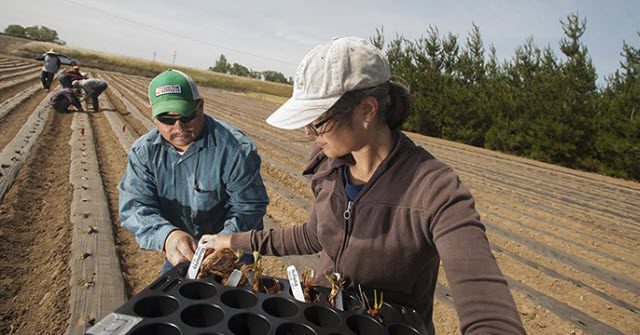 Senior technician Eduardo Garcia, left, and lab manager Charlotte Acharya, both of the UC Davis Department of Plant Sciences, prepare to place young strawberry plants in this field at UC Davis.Photo Credit: Gregory Urquiaga/UC Davis
Senior technician Eduardo Garcia, left, and lab manager Charlotte Acharya, both of the UC Davis Department of Plant Sciences, prepare to place young strawberry plants in this field at UC Davis.Photo Credit: Gregory Urquiaga/UC Davis
Strawberry farmers and industry leaders say new science, education, and collaborations underway at the University of California (UC) Davis Public Strawberry Breeding Program bode well for the quality and sustainability of strawberries in California. The breeding program has launched a large-scale genetic disease-resistance experiment, added students and staff researchers to its expanding team, and planted strawberry-yield trials on five farms from Ventura to Watsonville.
“It’s a privilege to participate in the novel research they’re doing at UC Davis,” said Tom AmRhein, a longtime member of the California Strawberry Commission and a strawberry producer with Naturipe Berry Growers Inc., near Castroville, site of one of the yield trials. “Growers are happy about the new focus and positive energy the team is bringing to the program. And because everything they develop is available to all strawberry growers, it protects the viability and sustainability of the whole industry.”
Related Article: Researchers Could Improve How Companies Ship Fresh Produce
The UC Davis strawberry breeders will present yield-trial data at two Strawberry Field Days in Watsonville and Santa Maria in June. Exact dates will be determined soon. Breeders will also present an update on the program’s activities, including:
Improving genetic resistance to disease
Strawberries are especially vulnerable to soil-borne pathogens, which can destroy an entire crop. Since the 1960s, strawberry growers have depended on fumigants like methyl bromide—a colorless, odorless gas—to control disease. But methyl bromide has been linked to lung disease and ozone-layer depletion, and will no longer be available after 2016.
Related Article: Scientists Create Trees with Enhanced Resistance to Greening
UC Davis breeders recently took an important first step in developing a berry with improved genetic resistant to soil-borne disease. In collaboration with the UC Davis Department of Plant Pathology, they planted strawberries representing 914 genotypes in a field south of the campus to begin identifying genes that influence resistance to the fungi Fusarium and Macrophomina, two common culprits in California, where 80 percent of U.S. strawberry production takes place.
“This will help us identify genes of interest, which we can analyze further in the lab,” said Glenn Cole, a staff research associate with the Strawberry Breeding Program. “It’s the first step in developing cultivars with greater genetic resistance to disease.”
Integrating genetic tools
The program is incorporating advanced, genetic tools into its breeding and will soon conduct DNA fingerprinting on the entire UC collection of germplasm, the living tissue from which new plants can be grown. Integrating genomic information, statistics, and the latest breeding strategies will accelerate the crop improvement process.
Related Article: New Tool to Unlock Genetics of Grape-Growing
To improve a crop, breeders traditionally cross plants with desired traits and select the best offspring over multiple generations. Some traits, like flavor and size, are often determined by many genes acting together, while other traits, like disease resistance, may be regulated by a single gene. Advanced genetic tools help breeders home in on genes that affect specific traits and select for those genes at an earlier stage, which speeds up the process.
“Genetic tools are an integral part of a successful breeding program,” said professor Steve Knapp, director of the Strawberry Breeding Program. “We look forward to helping develop 21st century strawberry breeding.”
Gathering germplasm
Breeders need genetic diversity of germplasm to develop quality crops that can resist constantly evolving pests, diseases, and environmental stresses. The Strawberry Breeding Program is building diversity by collecting strawberry species from the wild and germplasm from the USDA.
The new material is securely stored with the program’s already impressive collection of material, including some 1,700 cultivars. Of those 1,700 cultivars, 180 are considered elite and most likely to develop into a winning variety. The UC Davis breeders have planted those 180 cultivars on five farms along California’s “strawberry belt,” from Ventura to Watsonville, each with its own particular climate and crop-management strategies.
“Each farmer has his own recipe, as I call it, for growing the berries, which is good,” Cole said. “It helps us see how the crop performs in different environments.”
Nurturing tomorrow’s breeders
Teaching has become central to the UC Davis Strawberry Breeding Program, which now offers graduate education. The program will expand to include undergraduates soon.
“It’s important for the industry and to our land-grant mission to provide quality education and to train the next generation of breeders,” Knapp said.
Knapp teaches a graduate course in quantitative genetics, and mentors postdoctoral and graduate students like Dominique Pincot, whose family farms vegetables and strawberries in Santa Maria.
“I heard such wonderful things about Dr. Knapp from breeders, and I knew this was where I wanted to study,” said Pincot, who is working on her masters degree in horticulture and agronomy.
Enhancing flavor
A good berry should be sustainable, disease-resistant, and tasty, too. Postdoctoral scholar Julia Harshman is focusing on flavor.
“We’ll be conducting consumer surveys and working with sensory panels from the Robert Mondavi Institute to make sure all our varieties are full of flavor,” said Harshman, who previously worked with apples at Washington State University. “Flavor reigns in apple breeding. I want to bring that same attention to taste to strawberries.”
Dan Legard, vice president of research and education for the California Strawberry Commission, applauds the breadth of science underway.
Related Article: University's Field Days will Focus on the Flavor of Organic Vegetables
“Because all the data and material they develop is public, it will be available to any grower, which is so crucial in today’s competitive marketplace,” Legard said. “The novel work Professor Knapp and his team are doing is essential to our industry.”
And it’s vital to strawberry lovers worldwide, said Greg France, a longtime California Strawberry Commissioner and family farmer from Santa Maria: “The UC Davis Strawberry Breeding Program is setting the benchmark in breeding to improve strawberry quality, yield, and sustainability.”
















